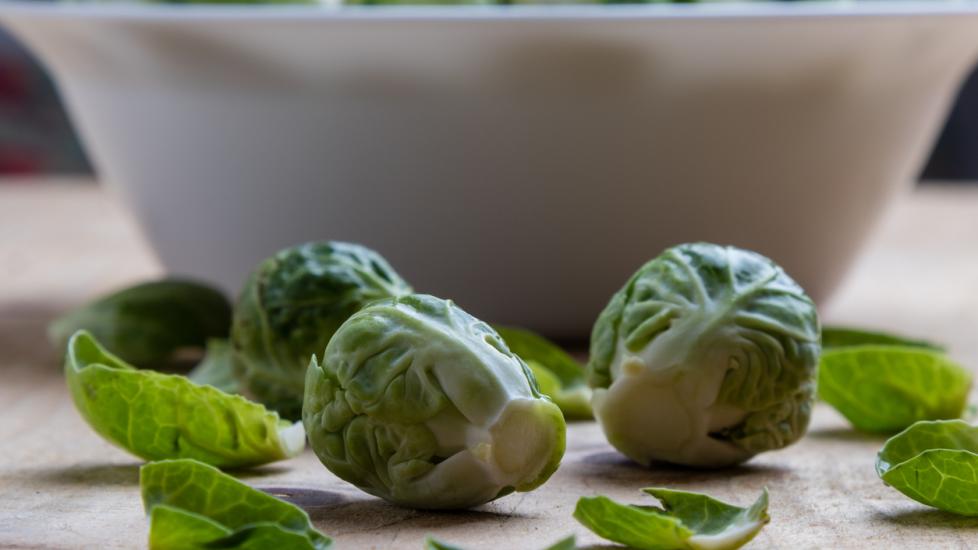Can Dogs Eat Brussels Sprouts?
NOTE: Always check with your veterinarian first before giving your dog any new foods, especially “people foods.” What might be OK for one dog might not be good for your dog, depending on multiple factors, such as their age, health history, health conditions, and diet. Dogs on prescription diets should not be fed any food or treats outside the diet.
As a dog parent, you may be wondering if Brussels sprouts are safe for your furry friend to eat. After all, you want to make sure that your pup is getting all the nutrients they need to stay healthy, and Brussels sprouts are a nutritious option for humans.
Brussels sprouts are OK for dogs to eat. When cooked properly and fed in moderation, these little veggies are safe for dogs to enjoy as a healthy treat or food topper. But before you start steaming up a helping of sprouts for your furry friend, there are a few things you’ll want to keep in mind.
Are Brussels Sprouts Good for Dogs?
Like many other veggies, Brussels sprouts are good for dogs when fed in moderation and prepared without ingredients that are not safe for them (such as garlic, onions, or salt). When cooked plain, Brussels sprouts are rich in vitamins and offer a bunch of nutrients such as fiber, vitamin C, and vitamin K that dogs need to stay healthy.
But you should proceed with caution before adding these veggies into your dog’s food bowl. Brussels sprouts are notorious for their unpleasant aftereffects, such as gas and bloating.
Can Brussels Sprouts Be Bad for Dogs?
While Brussels sprouts do offer some health benefits for your dog, you should probably hold off on dishing up a hearty helping every night. This fiber-rich veggie can cause digestive issues if eaten in large quantities or prepared the wrong way.
Brussels sprouts contain a type of carbohydrate called raffinose that can be difficult for dogs—and people—to digest, which can lead to excessive gas and bloating. A lot of flatulence isn’t necessarily unsafe, but it can be uncomfortable and annoying (and last for a while!) as your dog’s G.I. tract works to digest the veggies.
If you still decide to share your Brussels sprouts with your pooch, make sure they’re cut into small bites and limit the amount eaten. Never feed your dog a whole Brussels sprout—it’s large enough to choke on and cause an intestinal obstruction. Instead, cut the vegetable into small pieces and cook until tender.
Can Dogs Eat Brussels Sprouts Stalks?
While Brussels sprouts stalks are not toxic to dogs, they can be difficult to digest and may cause gastrointestinal upset. It's best to stick with the leaves and sprouts when feeding this vegetable to your dog.
How to Prepare Brussels Sprouts for Your Dog
If you’re not deterred by a potentially gassy dog, there are several ways to prepare your pup some Brussels sprouts. Start with a small amount: Try incorporating a tiny, cooked, plain bite of Brussels sprouts to your pooch’s regular dog food as a treat. That way you can monitor your dog's reaction for any signs of digestive upset or food intolerance.
Here are a few ways to safely prepare Brussels sprouts for your dog:
-
Steamed Brussels sprouts: Chop the sprouts into bite-sized pieces and steam them until they’re tender.
-
Roasted Brussels sprouts: Cut them into small pieces, toss in a little olive oil, and roast them in the oven until they are crispy. Just make sure to let them cool down before giving them to your pup (and avoid adding any seasonings that can make them sick).
Avoid giving your dog raw or frozen Brussels sprouts. Not only are uncooked Brussels sprouts bitter, they could be a choking hazard or cause an intestinal blockage if your dog eats them whole.
How Many Brussels Sprouts Can Dogs Eat?
If you decide to add Brussels sprouts to your furry friend’s mealtime routine, start slow. Incorporate a very small, cooked, plain bite to their dish and monitor for signs of digestive upset, like vomiting, flatulence, abdominal pain, and diarrhea. If any of this happens, cut back.
Here are some general portion guidelines to follow if you’re introducing Brussels sprouts to a healthy, adult dog:
-
Extra-small dog (2–20 pounds) = 1 teaspoon or less
-
Examples: Yorkies, Chihuahuas, Pomeranians, Pugs
-
-
Small dog (21–30 pounds) = 1–2 teaspoons
-
Medium dog (31–50 pounds) = tablespoon
-
Examples: Basset Hounds, Border Collies, Australian Cattle Dogs
-
-
Large dog (51–90 pounds) = 1–2 tablespoons
-
Examples: Pit Bulls, German Shepherds, Labrador Retrievers, Australian Shepherds
-
-
Extra-large dog (91+ pounds) = ¼ cup or less
-
Examples: Newfoundlands, Bernese Mountain Dogs, Saint Bernards, Great Pyrenees
-
Note that these are just general guidelines. It’s always best to check with your vet before making any changes to your dog’s diet.
What Other Veggies Can Dogs Eat?
There are several other veggies that are safe for dogs to eat. But consider yourself warned—some of these fiber-rich veggies can also cause increased flatulence. Moderation is key!
Remember that not all vegetables are safe for dogs to eat. Onions, garlic, and chives should all be avoided, as they are toxic to dogs. Again, always talk to your vet before introducing new foods to your dog. And as with any new food (even the safe, healthy kinds!) introduce veggies to your dog’s diet in moderation and watch for any signs of digestive upset.
Featured Image: iStock/furo_felix
